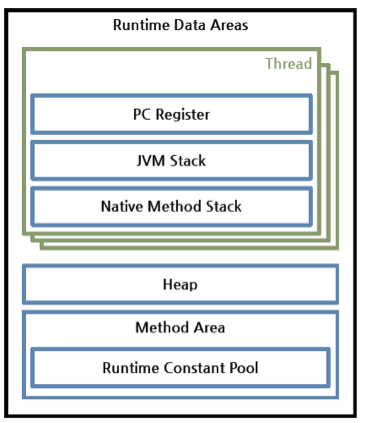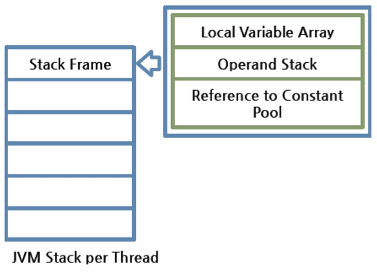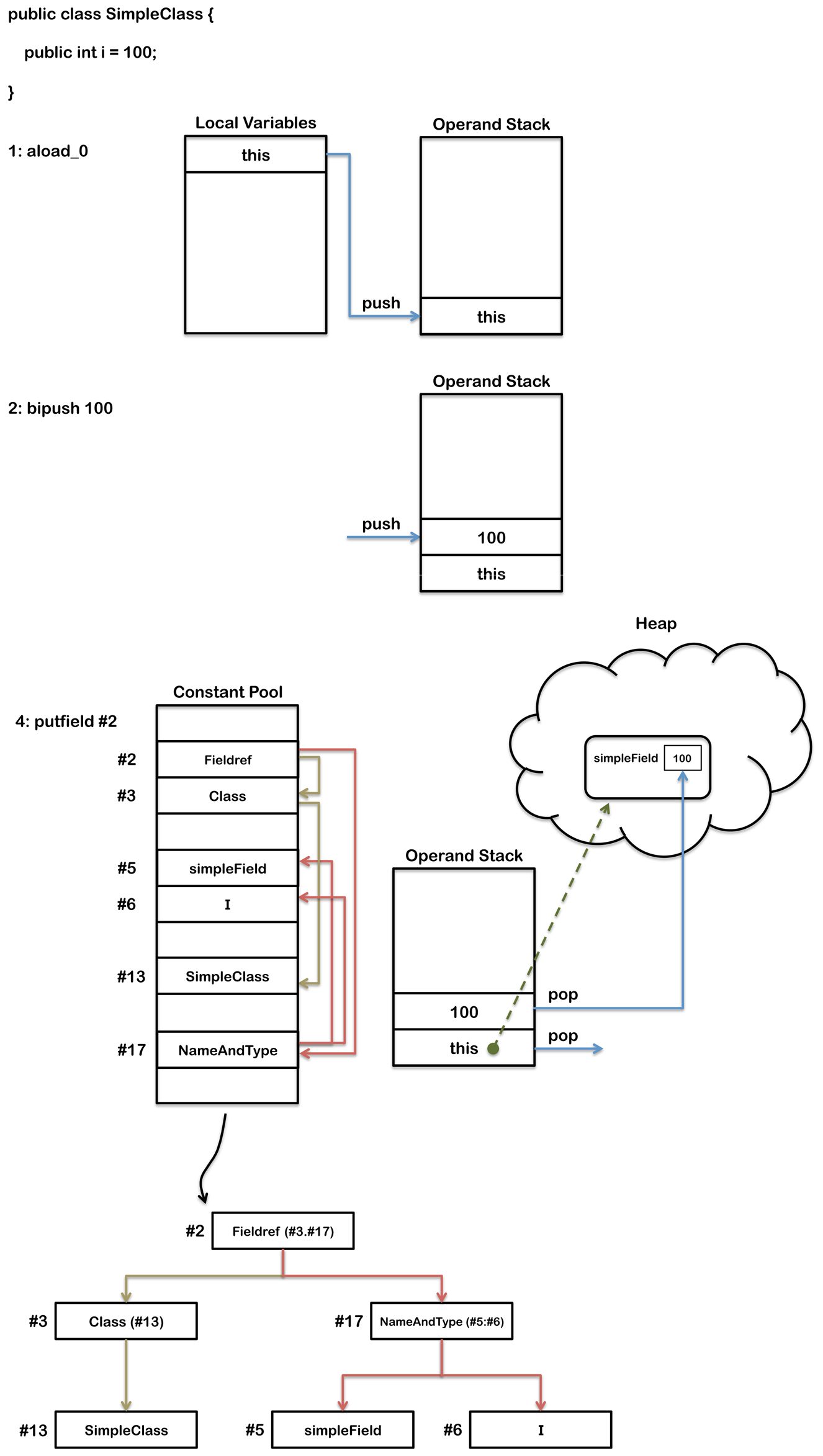Runtime Data Areas
-
PC (Program Counter) register
PC register has the address of a JVM instruction being executed now. -
JVM stack
It is a stack that saves the struct (Stack Frame).
Stack frame
Each stack frame has the reference for local variable array, Operand stack, and runtime constant pool of a class where the method being executed belongs. The size of local variable array and Operand stack is determined while compiling. Therefore, the size of stack frame is fixed according to the method.
-
Local variable array: It has an index starting from 0. 0 is the reference of a class instance where the method belongs. From 1, the parameters sent to the method are saved.
-
Operand stack: Each method exchanges data between the Operand stack and the local variable array, and pushes or pops other method invoke results. The necessary size of the Operand stack space can be determined during compiling. Therefore, the size of the Operand stack can also be determined during compiling.
-
Native method stack
A stack for native code written in a language other than Java. In other words, it is a stack used to execute C/C++ codes invoked through JNI (Java Native Interface). -
Method area
The method area is shared by all threads, created when the JVM starts. It stores runtime constant pool, field and method information, static variable, and method bytecode for each of the classes and interfaces read by the JVM. -
Runtime constant pool
An area that corresponds to the constant_pool table in the class file format. This area is included in the method area. As well as the constant of each class and interface, it contains all references for methods and fields. In short, when a method or field is referred to, the JVM searches the actual address of the method or field on the memory by using the runtime constant pool. -
Heap
A space that stores instances or objects, and is a target of garbage collection.
Java Bytecode
public void add(java.lang.String);
Code:
Stack=2, Locals=2, Args_size=2
0: aload_0
1: getfield #15; //Field admin:Lcom/nhn/user/UserAdmin;
4: aload_1
5: invokevirtual #23; //Method com/nhn/user/UserAdmin.addUser:(Ljava/lang/String;)Lcom/nhn/user/User;
8: pop
9: return LineNumberTable:
line 14: 0
line 15: 9 LocalVariableTable:
Start Length Slot Name Signature
0 10 0 this Lcom/nhn/service/UserService;
0 10 1 userName Ljava/lang/String; // … Omitted - Other method information …
}
-
Byte number
the number in front of the code (0, 1, 4...) -
OpCode
the bytecode instruction (aload_0, getfield...)
getfield need the 2-byte Operand, the next instruction of getfield on the first byte is written on the fourth byte by skipping two bytes. -
Index of class constant pool
(#15, #23) -
Locals
the length of local variable array
Slot 0: this (the reference for the current class instance)
Slot 1: userName (method parameter) -
Stack
the size of the Operand stack -
Args_size
the size of the argument (this, userName)
example1
java code
public class SimpleClass {
public int simpleField = 100;
}
byte code
public SimpleClass();
Signature: ()V
flags: ACC_PUBLIC
Code:
Stack=2, Locals=1, Args_size=1
0: aload_0
1: invokespecial #1 // Method java/lang/Object."<init>":()V
4: aload_0
5: bipush 100
7: putfield #2 // Field simpleField:I
10: return
constant pool
#1 = Methodref #4.#16 // java/lang/Object."<init>":()V
#2 = Fieldref #3.#17 // SimpleClass.simpleField:I
#3 = Class #13 // SimpleClass
#4 = Class #19 // java/lang/Object
#5 = Utf8 simpleField
#6 = Utf8 I
#7 = Utf8 <init>
#8 = Utf8 ()V
#9 = Utf8 Code
#10 = Utf8 LineNumberTable
#11 = Utf8 LocalVariableTable
#12 = Utf8 this
#13 = Utf8 SimpleClass
#14 = Utf8 SourceFile
#15 = Utf8 SimpleClass.java
#16 = NameAndType #7:#8 // "<init>":()V
#17 = NameAndType #5:#6 // simpleField:I
#18 = Utf8 LSimpleClass;
#19 = Utf8 java/lang/Object
Locals=1, Args_size=1 -> this
-
aload_0
the first local variable points to this ->
load the this reference onto the operand stack -
invokespecial #1
invoking the superclass constructor ->
corresponding to the index 1 of constant pool ->
Methodref #4.#16 ->
Object class init
default constructor
execute initialization code for class variables (field)
-
aload_0
the first local variable points to this ->
load the this reference onto the operand stack -
bipush 100
add a byte as an integer (100) to the operand stack (Stack=2) -
putfield #2
reference a field in the index 2 of runtime constant pool ->
Fieldref #3.#17 ->
the field called simpleField ->
pop 100 and this on the operand stack ->
100 to set the simpleField to this object that contains the field
example2
java code
public class TestClass {
public static void main(String[] args) {
Object foo = null;
Object bar = null;
}
}
byte code
public static void main(java.lang.String[]);
Code:
Stack=1, Locals=3, Args_size=1
0: aconst_null
1: astore_1
2: aconst_null
3: astore_2
4: return
LineNumberTable:
line 5: 0
line 6: 2
line 7: 4
LocalVariableTable:
Start Length Slot Name Signature
0 5 0 args [Ljava/lang/String;
2 3 1 foo Ljava/lang/Object;
4 1 2 bar Ljava/lang/Object;
Args_size=1 -> args
Locals=3 -> args, foo, bar
-
aconst_null
push the null onto the operand stack (Stack=1) -
astore_1
pop the reference from the operand stack ->
store it in the index 1 of local variable correspond to foo -
aconst_null
push the null onto the operand stack (Stack=1) -
astore_2
pop the reference from the operand stack ->
store it in the index 2 of local variable correspond to bar


